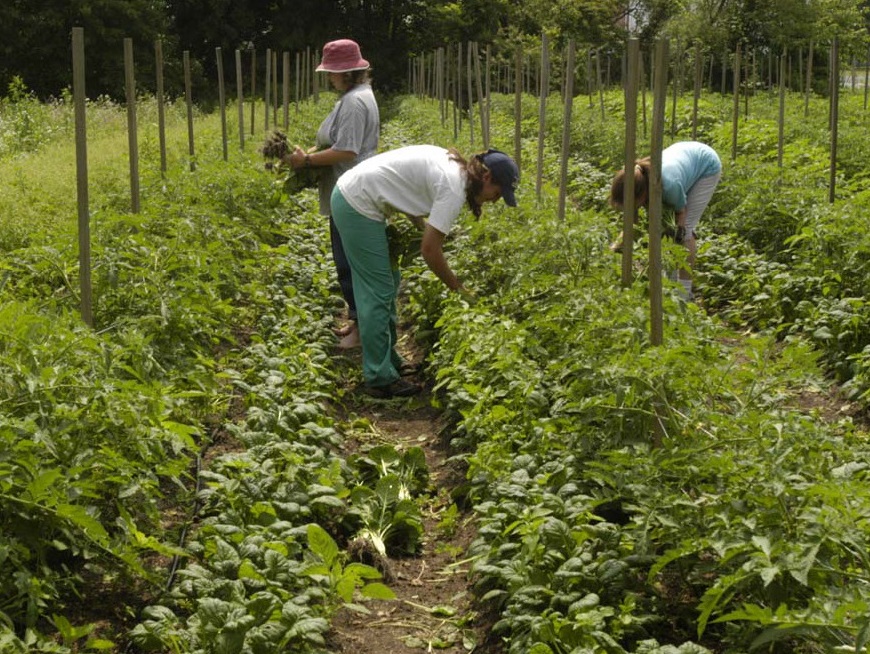Seasonal Gardening Tips: What to Plant and When for Finest Outcomes
Wiki Article
Understanding the Various Kinds of Horticulture and How They Add to a Much Healthier Way Of Life and Environment
:max_bytes(150000):strip_icc()/close-up-of-a-women-watering-vegetables-in-a-raised-bed-1407277094-c63fd1ff0a21406ebf17c51ac6c6f2d1.jpg)
Advantages of Vegetable Horticulture
Numerous individuals are progressively acknowledging the myriad advantages of vegetable horticulture as a vital element of a much healthier way of life. Taking part in veggie horticulture provides numerous physical wellness benefits, including boosted exercise, which boosts cardio wellness and promotes total fitness. The act of growing, weeding, and harvesting requires movement and can assist combat less active actions, adding to weight monitoring and enhanced muscle mass tone.Furthermore, growing one's very own veggies considerably boosts nutritional quality. Homegrown produce is often fresher and much more nutrient-dense contrasted to store-bought alternatives, as it can be eaten soon after harvest. This accessibility motivates a higher intake of vegetables and fruits, which are important for avoiding chronic illness.
Additionally, vegetable gardening promotes mental wellness by offering a therapeutic electrical outlet for tension relief and leisure. The act of tending to plants can be introspective, enabling individuals to get in touch with nature and get away the stress of every day life. The lasting technique of expanding one's very own food minimizes reliance on industrial farming, contributing to environmental preservation and promoting biodiversity. Jointly, these benefits emphasize the value of veggie gardening as a keystone of a much healthier lifestyle.
Exploring Flower Horticulture

Along with visual advantages, flower horticulture supports regional ecosystems. Several flowering plants attract pollinators, such as and butterflies, which are crucial for maintaining biodiversity. The presence of varied vegetation can likewise boost dirt wellness, as numerous plants add to nutrition biking and improve dirt structure.
Additionally, flowers can play a substantial duty in promoting lasting practices. Several garden enthusiasts choose for indigenous or drought-resistant types, which require less water and minimal chemical inputs. This method not only benefits the environment however additionally encourages liable gardening routines.
Inevitably, flower gardening acts as a crucial element of a holistic horticulture method. Gardening. By growing appeal and sustaining regional communities, it integrates with vegetable horticulture and highlights the significance of supporting both our physical and mental health through nature
Container Horticulture Benefits
Container gardening deals many advantages that make it an attractive option for both novice and knowledgeable gardeners. One of the main benefits is its flexibility; containers can be put on outdoor patios, porches, or perhaps inside your home, enabling for horticulture precede with minimal ground gain access to. This versatility enables people in metropolitan settings or those with tiny lawns to cultivate plants properly.In addition, container gardening offers enhanced control over soil high quality and dampness levels. Garden enthusiasts can pick details soil mixes to enhance plant wellness and mitigate concerns like weeds and insects. The flexibility of containers also allows for simple relocation to make best use of sunlight exposure or protect plants from stormy weather.
Moreover, container gardens can be visually pleasing, supplying a chance for creative thinking in layout. Gardening. They can act as ornamental components that boost exterior or indoor spaces while promoting biodiversity by bring in pollinators
Lastly, container horticulture can contribute to a healthier lifestyle by encouraging exercise, as it commonly includes lifting, planting, and preserving plants. On the whole, the advantages of container gardening make it an obtainable and gratifying go to these guys technique for those seeking to improve their way of life and environment.
The Rise of Vertical Gardening
As metropolitan rooms become progressively crowded, the pattern of vertical gardening has taken off, permitting individuals to optimize their horticulture potential in minimal areas. This cutting-edge strategy involves growing plants in vertical frameworks, such as wall-mounted planters, trellises, or specialized vertical yard systems. The allure of upright gardening lies not only in its efficient important site use of space yet also in its aesthetic payment to urban settings, transforming bare walls right into lavish green landscapes.Vertical yards can be mounted in homes, balconies, and community areas, offering a system for expanding a selection of plants, including natural herbs, veggies, and ornamental blossoms. This method encourages biodiversity and can enhance air top quality by filtering pollutants while promoting a connection to nature in densely populated areas. Furthermore, vertical horticulture provides practical benefits, such as boosted return per square foot, making it an appealing option for urban garden enthusiasts looking for to expand their very own food.

Lasting Practices in Gardening
Welcoming sustainable practices in horticulture is necessary for advertising ecological health and making sure the feasibility of our all-natural sources. Sustainable horticulture strategies concentrate on reducing environmental influence, preserving water, and fostering biodiversity. By carrying out practices such as organic gardening, garden enthusiasts can reduce using synthetic plant foods and pesticides, which can damage neighborhood ecosystems.Buddy planting is one more efficient lasting method, where specific plants are expanded together to enhance growth and hinder bugs naturally. In addition, making use of native plants in landscaping sustains local wildlife and requires much less upkeep, as they are naturally adjusted to the local climate and dirt problems.
Water preservation methods, such as rainwater harvesting and drip watering, help to effectively manage water sources, therefore lowering waste. Composting natural waste not only enhances the soil however also reduces land fill payments, advertising a circular economic situation.
Finally, practicing crop rotation and cover chopping enhances dirt health and minimizes the danger of parasite invasions. By integrating these lasting techniques, garden enthusiasts can develop resilient environments that add to a much healthier way of life while protecting the atmosphere for future generations.
Final Thought

Finally, the varied techniques of horticulture, including vegetable, blossom, container, and vertical horticulture, collectively promote a healthier way of living and boost check here environmental sustainability. Each type uses distinct advantages, from giving fresh produce and attracting pollinators to optimizing limited spaces and encouraging biodiversity. By fostering sustainable practices, these horticulture approaches not only add to private well-being yet additionally sustain wider ecological preservation efforts, inevitably lowering reliance on business agriculture and enhancing community strength.
Report this wiki page